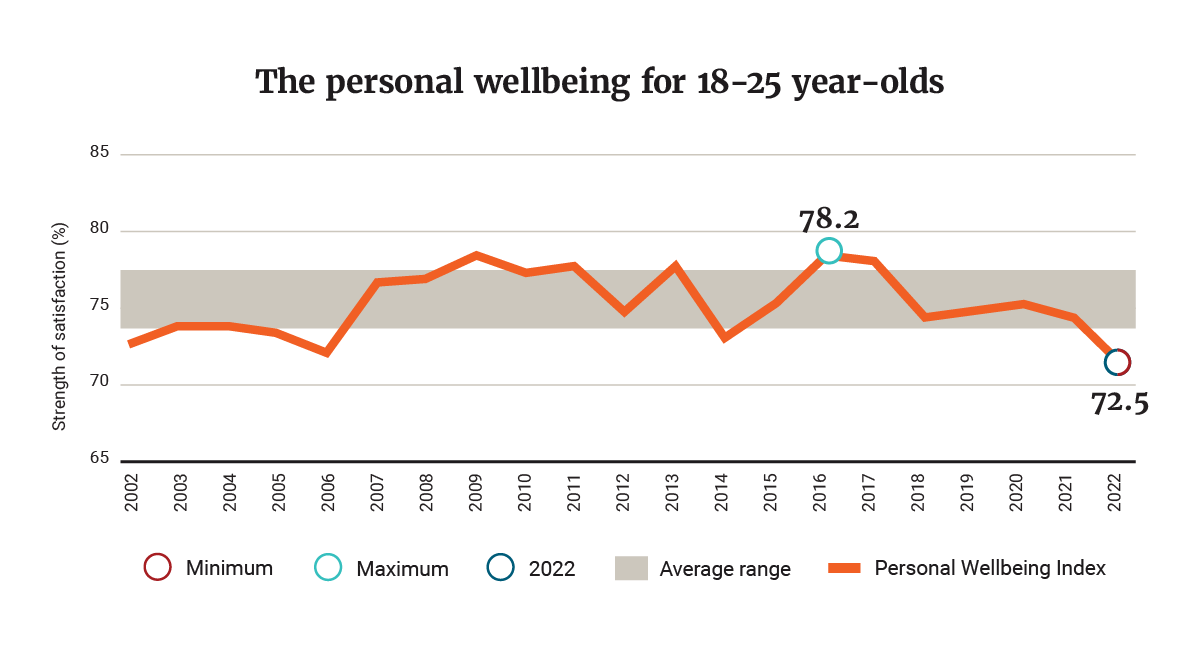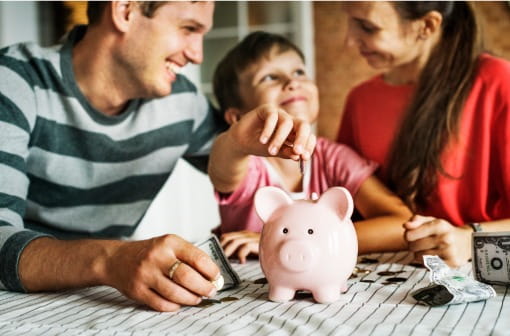“Young people are just being dealt so much at once.”—Dr Kate Lycett, School of Psychology, Deakin University
Key points
- The latest results from the Australian Unity Wellbeing Index show that young people aged 18 to 25 have reported their lowest wellbeing scores on record.
- A complex array of issues—including the mental health crisis, the effects of the pandemic, the cost of living, the lack of affordable housing, and climate change—mean it's a particularly challenging time to be young adult in Australia.
- There is, however, a glimmer of hope. While young people are more likely to worry about climate change, they’re also the most optimistic about finding a solution.
We’re often told our early adult years are “the best years of our lives”.
Unfortunately, the latest results of the Australian Unity Wellbeing Index—a 22-year research study delivered in partnership with Deakin University—suggests that young Australians are facing challenges to their wellbeing on multiple fronts.
So what does the research tell us about the wellbeing of young Australians? And, as parents, carers and friends, how can we support the young adults in our lives?
.jpg?h=650&w=1200&hash=927A1B379F69DD4CAE6AEF0270D33625)
Wellbeing challenges
It is, undeniably, a difficult time to be a young adult. In 2022, when the latest Australian Unity Wellbeing Index survey took place, 18- to 25-year-olds recorded the lowest wellbeing scores of any age group and their worst scores since the Australian Unity Wellbeing Index began over two decades ago.
This age bracket also scored poorly when it comes to the three measures of mental distress, posting the highest levels of anxiety, stress and depression of any demographic in this study.
Asked if younger Australians are facing a wellbeing crisis, Australian Unity Wellbeing Index lead researcher Dr Kate Lycett, from Deakin University's School of Psychology, is blunt. “Yes,” she says.
“It's a really challenging time for so many. People are increasingly struggling with the cost of living, the housing crisis, climate change and the upheavals of the pandemic, which is particularly the case for young people.”
Wide-ranging issues and no quick fix
While there is no doubt about the challenges young adults are facing, there is also no single easy solution.
“Their sense of purpose in life has also been affected,” says Kate.
“Everything got disrupted by COVID-19—a lot of these kids were doing year 11 and 12 during the pandemic. Plus, there is stress and anxiety associated with climate change.
“So there’s just all this huge uncertainty about life in general, and this is a major transition period when mental health problems can emerge or be compounded.”
So, is there anything that can be done to support young Australians' wellbeing?
On one level, Kate suggests, policies have to adapt. For her, two key priorities are creating opportunities to get young people into the workforce and ensuring they have access to affordable housing and healthcare, particularly mental health support. But she also sees a need to foster resourcefulness and resilience in our kids.
“We certainly need to invest in children and young people and future generations. And it's delightful to see that young people are very high on the policy agenda at the moment, but there's a lot that we need to do.
“Young people are just being dealt so much at once,” continues Kate. “So I think the biggest skill they need is being able to adapt in life to be able to deal with all these challenges. It’s key that we increase our children's capacity for adaptability. But we also need to ensure we provide nurturing policy environments for them to thrive."

A glimmer of hope on climate change
One daunting challenge is the increasingly urgent issue of climate change—and it's a problem that's particularly apparent to the younger generations. The Australian Unity Wellbeing Index results show that the two youngest age groups (18 to 25 and 26 to 35) are the most worried about climate change, with levels of concern decreasing with age.
“Young people have grown up in an era where climate change is front and centre,” Kate points out. “They're experiencing disasters, they're seeing floods, they're seeing fires and they’ve been living through all that from a young age.”
There is, however, a sliver of positivity in the fact that this group is also the most optimistic about tackling the issue. The youngest adults in our survey felt most strongly that climate change can still be kept under control.
For parents and carers of young Australians, there is a fine balance between encouraging optimism and action on climate change while avoiding sugar-coating a bleak topic.
As a mother of three teenagers, and a spokesperson and volunteer leader for Australian Parents for Climate Change, Deanna Hayes is learning to navigate this subject with her kids. She admits that the environmental situation is often discussed in her household, but she’s careful not to put too negative a slant on the subject. “If there’s an extreme weather event, I'm certainly not going to say: ‘Oh my! Look what's happening here! What are we going to do about this?’,” Deanne says.
Instead she’s consciously decided to maintain a calmer, more considered approach. Rather than force a discussion, Deanna prefers to wait until her children bring up the subject. “I'll talk to them about it if they want to talk about it.”
At the same time, Deanna has made a concerted effort to empower her kids with a sense of hope. “With my son who’s 18, for example, it’s about helping him to feel like you can actually do something, you can take some kind of action yourself and play your tiny little part to make things a bit better.”
Ultimately, however, actions speak louder than words. Ask yourself what can you do to lead by example?
That’s why, as a parent, Deanna feels obliged to be mindful of her own habits. “It’s just about doing your bit within your own little scope, without putting it on your children and telling them that if they don't do the same then it's terrible,” says Deanna. “For me, it’s just about leading by example.”
There's little doubt that young Australians are facing significant and unprecedented challenges to their wellbeing. There's no quick fix—but targeted policy decisions, a focus on resilience and the support of loved ones all offer the potential for optimism.
Disclaimer: Information provided in this article is of a general nature. Australian Unity accepts no responsibility for the accuracy of any of the opinions, advice, representations or information contained in this publication. Readers should rely on their own advice and enquiries in making decisions affecting their own health, wellbeing or interest. Interviewee titles and employer are cited as at the time of interview and may have changed since publication.


